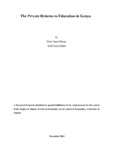| dc.description.abstract | Education has been defined as the process through which knowledge; skills, attitudes and
values are imparted for the purpose of integrating the individual in a given society, or
changing the values and norms of a society. Education provides both direct and indirect
benefits for the individual who receives the education and the society to which this individual
connects (Kifle, 2007). The magnitude to which education increases benefits to an individual
is referred to as the economic ‘return’ to education (Colclough et al., 2009). These returns
are majorly categorized into private and social returns to education. The current study
embarked on the examination of the private returns to education in Kenya using the
Mincerian Earnings Function with the Ordinary Least square method in the data analysis
with the aim of identifying whether the Kenyan education system bears returns, both to the
individual and the society along with the education level in Kenya that bears the highest
returns to education.
The data used in the analysis was obtained from the Kenya Integrated Household budget
survey 2005/2006 conducted by the Kenya National Bureau of statistics under the Ministry of
Planning and National Development. Findings from the study indicate that nationally,
university level of education has the highest private returns to schooling (40%) and primary
level the lowest at 11%. In terms of gender, the study finds that females earn much higher
returns than the males at the primary level of education but males earn higher returns
compared to women at the other levels of education.
In addition the study finds out that employees in rural areas have higher private returns to
schooling at primary level at 18% compared to 15% percent for their urban area
counterparts while urban workers enjoy higher returns to schooling at secondary and
university level of schooling than their rural area colleagues. The results drawn from this
study do indicate that it is really rewarding for anyone to progress to higher levels of
education (university) as it yields higher returns compared to those who complete their
studies at the lower levels of education. | en_US |

